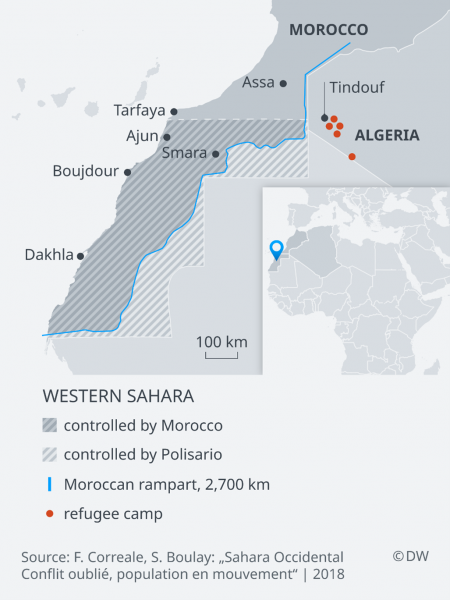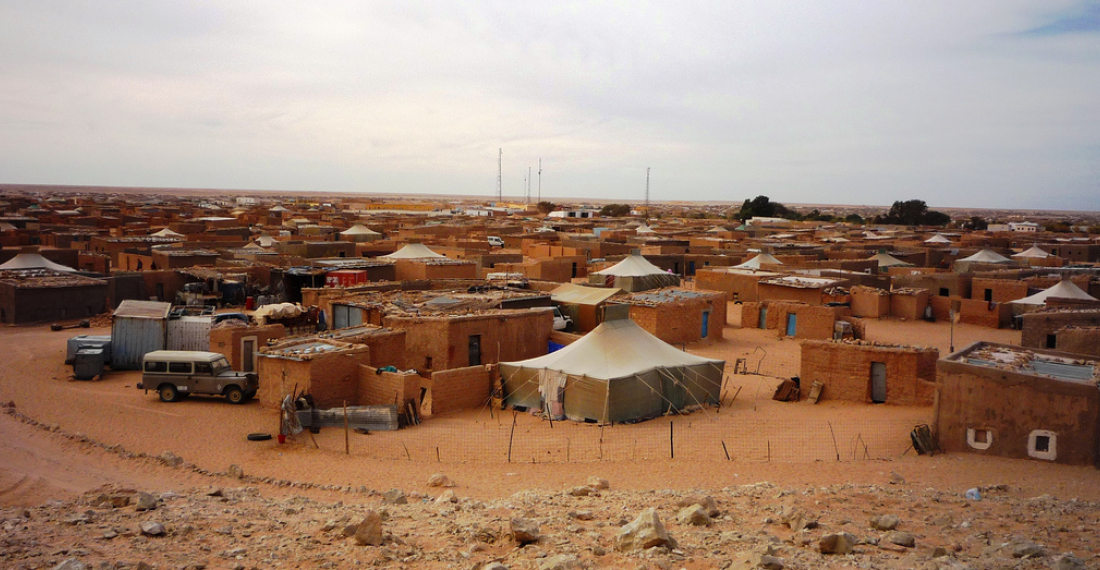The last few days have seen an increase in tensions between Moroccan forces and the Polisario Front in the disputed Western Sahara region. Clashes started in El Guerguerat, an area close to the border with Mauritania regularly patrolled by UN Peacekeepers from the United Nations Mission for the Referendum in Western Sahara (MINURSO) who maintain a 29-year-old ceasefire. Morocco has denied any victims contrary to the information from the Polisario in this regard.
The conflict seems to be triggered over a blocked road connecting Morocco with Mauritania albeit passing through the UN buffer zone. The General Staff of the Moroccan Royal Armed Forces said in a statement that a security cordon was placed overnight “in order to secure the flow of goods and people through this axis,”. However, the Polisario’s envoy to Algeria, Abdelkader Omar, said Moroccan forces “opened fire on innocent civilian protesters” and thus the Polisario fighters came to the protesters’ defence, which prompted “intense clashes” on Friday. The statement by the General Staff of the Moroccan military said arms would only be used in self-defence. On the other hand, the Polisario said it would retaliate against any attack on its people.
It is not clear what exactly happened in El Guerguerat with some unconfirmed accounts suggesting that a road blockade had been ongoing for several weeks. Al Jazeera reported on 200 truck drivers who appealed to Moroccan and Mauritanian authorities for help, saying they were stranded on the Mauritanian side of the border near El Guerguerat unable to cross into Morocco.
In the aftermath of the El Guerguerat events on Friday (November 13), the Moroccan army confirmed that the Guerguerat crossing has become entirely safe. The Moroccan and Saharawi forces are in a state of maximum alert, and a cautious calm hanged over the region's atmosphere in the last days. However, it is impossible to know the situation on the ground given the vast desert areas and the media campaigns by both sides that portray different stories. The Secretary-General of the Polisario Front and leader of the Saharawi Republic, Brahim Ghali, declared an end to the ceasefire, and there are reports that volunteers signed up to join the Polisario forces. The legal basis for mobilisation, according to several Saharawi officials and activists, is that the operation on Friday occurred in a demilitarised zone.
International Response
The international community called for restraint and to respect legal structures around the Western Sahara issue. Stéphane Dujarric, Spokesman for the UN Secretary-General, said that António Guterres “expresses grave concern regarding the possible consequences of the latest developments.”
MINURSO is committed to continue implementing its mandate and the Secretary-General [of the UN] calls on the parties to provide full freedom of movement for the Mission in accordance with its mandate.
The European Union joined the UN and called for avoiding escalation and to respect the ceasefire enacted since 1991.
The EU joins the UN in its call against the escalation and in respecting the ceasefire in force since September 6, 1991 and the continuation of the political negotiations suspended in 2019,
The High Representative of the European Union, Josep Borrell, spoke on Sunday with the Ministers of Foreign Affairs of the Morocco Nasser Bourita and Algeria Sabri Boukadoum, to learn about the latest developments highlighting the necessity for the freedom of movement and the strategic importance of the region. Borrell affirmed the full support of the EU for the efforts of the UN and its Secretary-General. Borrell also proposed appointing a new Personal Envoy of the Secretary-General of the UN for Western Sahara, a position that has been vacant since last year and is essential to the resumption of dialogue.
In a similar statement, the Spanish Foreign Ministry called for resuming negotiations and to proceed towards a politically just and acceptable situation for both parties. Several Spanish MPs however, highlighted that Morocco has the right to intervene to protect its lands, suggesting that commercial transport is important for the region and Spain. Some countries were more outspoken in their support of the Moroccan military activity. These countries, which include GCC bloc, condemned the Polisario and accused it of breaching the ceasefire. Meanwhile, the Egyptian and Russian MFA offered neutral diplomatic remarks.
Historical Background
The recent clashes are the latest in the simmering conflict over the status of Western Sahara, which has been disputed since the departure of the colonial power, Spain, in 1975. The Polisario Front was initially created in 1973 to fight against Spanish colonialism. In 1975, after the Spanish left, Morocco annexed the territory, triggering a war with the Polisario. A ceasefire in 1991 established the MINURSO yet Morocco considers the Sahara to be its rightful sovereign territory. A referendum on Western Sahara’s future never took place, and several analysts and activists suggest that a delay of a referendum has agitated the Polisario’s sentiments and hence, the UN “failed in its obligations”.
Looking back into the historical context, both sides bolster their cases with historical and legal arguments. Morocco says the Sahara has been loyal to Morocco since the 11th century when the Saharan rulers pledged allegiance to the rulers of Morocco. This allegiance, as per the Moroccan narrative continued until Spain colonised the Sahara in 1884. The narrative was integrated or rather portrayed later in the context of competing French and Spanish colonial powers. When Spain left Morocco in 1956, the latter gradually sought to regain control of the Sahara. In 1975, upon the departure of the Spanish from Western Sahara, the Hague-based International Court of Justice gave an Advisory Opinion that the Sahara has legal and historical ties with Morocco. However, Morocco cannot claim any sovereignty over the Sahara. Morocco has since tried to take control of Western Sahara which culminated in its unilateral annexation and a war over Western Sahara.
On the other hand, the Polisario Front claims to be the legal representative of the Saharawi people even before the annexation. To legitimise its cause, the Polisario established the Saharawi Arab Democratic Republic which was admitted to the Organisation of African Unity. In the aftermath of the war, Morocco controlled 80 per cent of Western Sahara while Mauritania gave up on its claims. The MINURSO established a buffer zone and the Moroccan military erected its defensive earthwork structures (berms). Tens of thousands of refugees settled in camps hosted primarily by Algeria.
The recent clashes and the revocation of the ceasefire served to highlight once more the recurring contradictory narratives, and the impatience with the task allocated to the MINURSO. The Moroccan narrative suggests that the Polisario blocked and detained truck drivers while the Polisario says it was only reacting to human right violations of Morocco. When clashes started, each argued that the other side opened fire and destroyed properties.

The Polisario Front feels neglected and betrayed by the failure to hold the long-awaited referendum. Cutting a key trade route is for them an effective way of pressuring Morocco. The Polisario is not fond of Moroccan socioeconomic activity in what it claims to be Moroccan occupied Western Sahara. Morocco seems to believe that the Polisario Front has lost the momentum. It has claimed that the Polisario is politically dead and ignored by the international community. With the political harassment in Western Sahara and the stalemate of the UN, Morocco and Polisario could find themselves at a full-scale war again.
The Polisario continues to rely heavily on Algerian support. In 1975, Algeria was actively helping the Saharawis which put it in a clash with Morocco. Since then, Algeria has been a strong advocate for the Front’s cause. As in the early years of the conflict, Algeria could choose to back the Polisario militarily if a larger conflict escalates. Both Algeria and Morocco are heavily armed yet face several domestic and economic challenges.
Several Saharawi activists and some tribal groupings agree on the political decay of the Front. Not all Saharawi tribes support the Polisario, a fact that Morocco has exploited. Over the years, some tribal groups have criticised the action of the Polisario and rallied behind the Moroccan government. A movement known as Saharawis for Peace, have advocated for a renewed Saharawi political rhetoric portraying voices not associated with the political elite of the Polisario.
Peace Efforts
The Moroccan King Mohammed VI addressed the issue of Western Sahara recently where he spoke of a new path of diplomatic commitment and economic achievements whilst asserting the “Moroccanness” of the Sahara. Nonetheless, King Mohammed VI hoped for a peaceful political resolution. He reaffirmed Morocco’s commitment to the Autonomy plan that Morocco and the US Congress support. This is the second major plan after an earlier version known as the Baker Plan was rejected by all concerned parties. The current plan would grant autonomy to the people of Western Sahara. The plan envisages that the Saharawis would run their government under Moroccan sovereignty, with Rabat retaining control of the defence and foreign affairs. The Polisario rejected the plan calling for full independence from Morocco.
The UN, through its mission – MINURSO, is still expected to maintain the ceasefire, and take quick steps to determine the political future of the Sahara. Yet the effectiveness of MINURSO, without a renewed commitment from Morocco and the Polisario Front, is doubtful.







